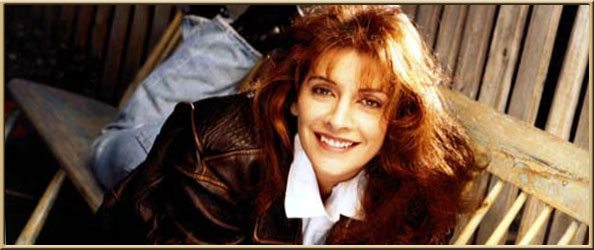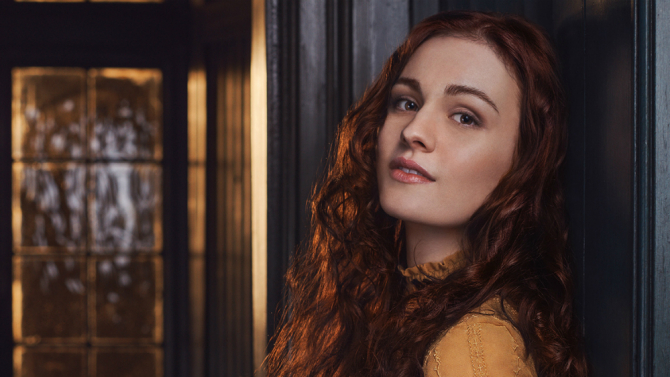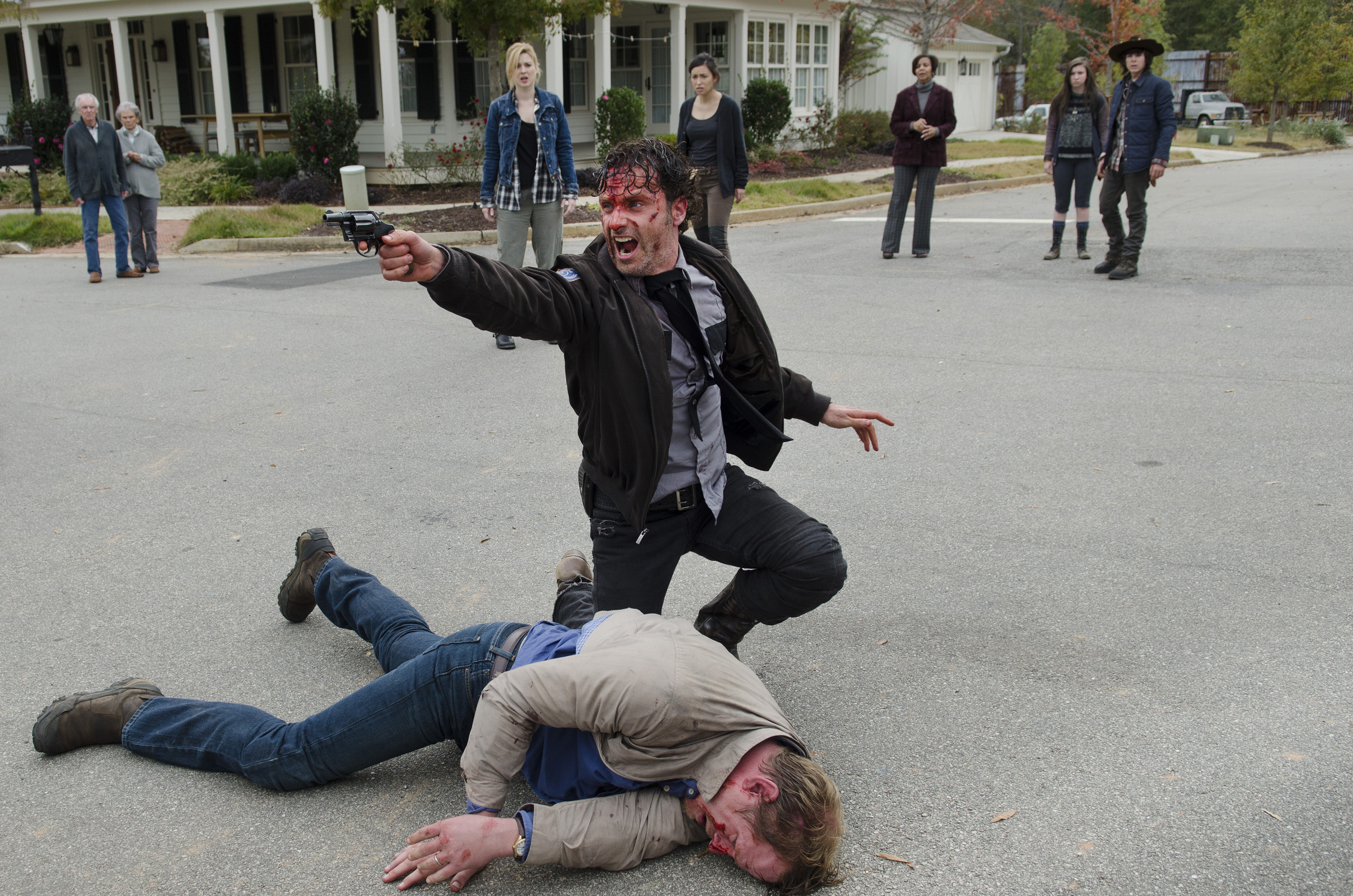MARINA SIRTIS is a Class Act
At the first GlitchCon in Bentonville, AR, Marina Sirtis tells stories of how she almost didn’t make it past the first season of “Star Trek: The Next Generation”. Of how Gene and Majel unofficially adopted this young actress from England. Of how Majel was the one who said, “Start doing conventions.” And how, after the departure of Denise Crosby and Gates McFadden at the end of season one, she suddenly became “the Chick”.
Her favorite TNG episode: “A Fistful of Datas”
She’s very engaging in person, with dry humor, witty banter, and a deep appreciation for her fans. Her closing remarks always include the observation that many celebrities don’t appreciate the fans, those who made them celebrities in the first place. “So, thank you for my house. Thank you for my husband. If it hadn’t been for the show, I never would have met him. And thank you for my Porsche.” It’s a classic Carerra. Black-on-black-on-black.
I got to sit down with Marina and talk about her work on “Star Trek: The Next Generation” along with what she’d really like to be doing next. And along the way, she shared some interesting perspectives on acting and why there are so many remakes out there:
[main image: www.marinasirtis.tv]
[Transcript follows]
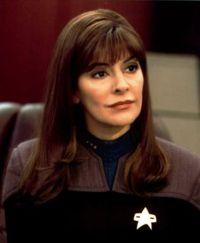 JPH: We’re at GlitchCon in Bentonville Arkansas talking with Marina Sirtis of course of “Star Trek: The Next Generation”, “Gargoyles”, and most recently “Grey’s Anatomy”.
JPH: We’re at GlitchCon in Bentonville Arkansas talking with Marina Sirtis of course of “Star Trek: The Next Generation”, “Gargoyles”, and most recently “Grey’s Anatomy”.
Marina Sirtis: Yes.
JPH: And I wanted to ask what’s next?
MS: Actually what’s next is something called the Panto. Do you know what that is? No, ‘cause you’re American, you see. Pantos are a tradition in England where you do a show at Christmas. It’s usually based on a fairy tale. You know, we’re doing Snow White and there’s a lot of jokes in it that are very topical – we’ll have jokes about the Kardashians – it’ll be very “now”. We’ll be singing – it’s a musical, with pop songs in there…
JPH: Are you dressing like a Kardashian?
MS: No, no. I’m actually going to be the Wicked Queen, the Wicked Step-Mother, which is really weird because the last Panto I did was in England thirty years ago, and I was Snow White. So, time has flown since then. But I’m really looking forward to it because they’re such fun shows. I mean they’re basically kid shows, but some of the jokes are more for the adults…
JPH: Sure.
MS: … so that the adults enjoy as much of the kids. In fact I was in England a couple of Christmases ago, and I went to a Panto, you know, and I’m not a kid, because they’re just such a part of our Christmas in the UK.
JPH: So it’s kind of a common thing.
MS: Oh, it’s common! Every city, every town has its Panto at Christmas.
JPH: Now speaking of holidays and get-togethers with family I need you to confirm or deny: Michael Dorn tells a story…
MS: Yeah. Probably not true then.
JPH: … and I think this one involves.. probably before you were married, even. This goes this far back.
MS: Right.
JPH: Where you had a number of the cast members over for dinner and he walks into the kitchen and there’s a big platter of ribs on the kitchen counter yet he reaches for them and you slap his hand and say “That’s not for you. That’s for the dog.”
MS: [laughing] It probably wasn’t ribs. It was probably a stew or something.
JPH: For the Yorkshire Terrier.
MS: Yes. I cook for my dogs. Yeah. I don’t have that dog anymore, unfortunately. He passed away, but I have never fed my dogs dog food. So I cook for my dogs. Usually some kind of stew, you know. And if I don’t have time to make two meals – you know, my husband will come home and say “What are we having for dinner tonight?” and I’ll say, “Dog food.” [laughing]
JPH: Do you still get together with members of the cast from TNG or are you guys scattered enough now that it’s hard to do anything?
MS: No, no. The only person we don’t see as much as we’d like to, is Patrick, because he’s gone back to England. But the rest of us, we still get together. We are still best friends. It’s really a unique experience in Hollywood because generally once a show breaks up, you know, everyone goes their separate ways. But we created – well, we didn’t create it – we had a bond on the show from day one, where we just fit. You know, we were like a jigsaw puzzle that fit. And we’ve never broken up the jigsaw puzzle. We’re still all together.
JPH: Various, different member of the cast had started to show up on other shows. “Warehouse 13”, “Alphas”… Has anybody talked to you, are you next in line for a guest shot on the Monday night lineup?
MS: Oh, you know what? I show up on people’s shows. The problem is no one ever recognizes me, because I don’t play – I tend to play more character parts now. Ever since I did Crash. I was in the movie Crash and played an unrecognizable Iranian lady. I tend to get a lot of those kinds of thoughts now and so sometimes people don’t even realize that they’ve seen me because I’m usually doing an accent and usually not glamorous at all. I’m not interested, really in doing those glam parts. The meatier parts are more character parts. And so, yeah, you probably have seen me but didn’t realize it was me.
JPH: “Grey’s Anatomy “ was one of those. You were actually playing an Iranian in that one as well
MS: Yeah, I play a lot of Iranians.
JPH: Do you find that you’re Greek heritage and the particular look that you have, physicality is giving you an opportunity to play more of those kinds of parts or are you actively pursuing that particular thing?
MS: No, actually Hollywood is kind of weird because when you look through the shows that are coming up, and the parts that are in those shows, there really isn’t a lot of work for – I don’t want to say “white women” because I’m white – but for pale Anglo type of women. There are parts, however, for ethnic women in their fifties. So I just count my blessings, actually, at this point in my career that I do look ethnic, and I can play various nationalities. Because I’ve always been able to accents. It’s one of my God-given gifts, thank the Lord. And so it’s really helping me right now because there really isn’t much else. Unless you’re going to be a judge. I know Gates (McFadden) is a judge on “Franklin and Bash”. She played a judge recently. Unless you’re going to be a in “Law & Order” or something, there really isn’t much out there for women in their fifties. So I’m lucky. I’m really lucky. It went against me in early in my career, that I look so ethnic, but it seems to be working for me now.
JPH: Some of your fellow cast members have also gone the route of web series. Specifically “Star Trek: Phase Two”. Denise Crosby was on there, George Takei, Walter Koenig. Have you been approached to do anything on the web, and what do you think about that kind of a production, because there are some that are just dreck. They’re absolutely terribly done because they’re amateurs. But there are some of them, that the quality of them is at or near the professional level that you would expect out of L.A. Have you given any thought to doing projects like that?
MS: I’m a Luddite. I don’t know if you’re audience know what a Luddite is. Back in the Industrial Revolution in England, the Luddites were the people that went around smashing the machinery because it was taking jobs away from people. I feel a bit like that, because I hate technology, and I do worry that we’re losing so many jobs that are now being done by machines. And it worries me. What are we going to do with all these people that aren’t working?
So, on a certain level, I’m “anti” that whole concept. But I think what’s going to happen – because right now, I think those series aren’t really being produced by studios or real professional producers who do it as their jobs.
JPH: Well, on the other hand you do have shows like … Funny or Die, for example, or Crackle, which are Web sites that are given to very specific projects that involve people like Will Ferrell or Michael Ironside; some really top shelf, A-level actors and production teams.
MS: Right. I didn’t know that.
JPH: And it’s not it’s not common yet but if you see shows like “The Bannen Way” which is a web series that started on Crackle, and has now been picked up for a DVD and all that. I’m wondering if we’re seeing things rise to a level where you were going to get the cream of the crop on that, just as another channel.
MS: Well, to be honest without getting too political on you, I’m a big supporter of our union. And our union, at the moment, does not have a deal with the Internet. We don’t have any payment schedules. We don’t have any residual schedules. We don’t have any recourse. The Union doesn’t protect us if we do web shows. So I think when the union and the technology and whoever is making these shows get together and they create some kind of contract that protects the actors, then I will do them. But at the moment… I’m sorry. I don’t work non-union. You know. It’s one of my things, that I’m in a union that really does – is a great union. If it wasn’t for SAG, I wouldn’t have health benefits, I wouldn’t have my health insurance. I wouldn’t have a pension. The union is very good to us, and so I feel it’s beholden to the actors to respect the union. So when there’s a union contract with the Internet, I’m sure I’ll be on there.
JPH: We’re seeing a lot of remakes of shows – “The Dukes of Hazzard”, “Star Trek” now…
MS: “Hawaii Five-O”.
JPH: “Hawaii Five-O”.
MS: “Charlie’s Angels”.
JPH: “Charlie’s Angels”, “V”…
MS: Right.
JPH: When people talk about some of these new things – “Thundercats” being one of the more recent ones, as a remake that Cartoon Network has done.
MS: Right.
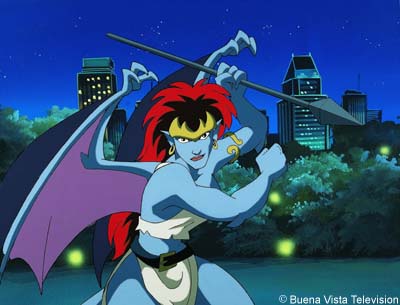 JPH: When people talk about “Thundercats”, the next sentence is always (about) “Gargoyles”.
JPH: When people talk about “Thundercats”, the next sentence is always (about) “Gargoyles”.
MS: Right.
JPH: When is “Gargoyles” coming back? Have you heard any…? Nobody’s talked to you about doing “Gargoyles” again?
MS: No. In fact, I still work with those people. I still work for Greg and Jamie on a show called “Young Justice”. I’m Queen Bee, a recurring on that show. It’s exactly the same producers, directors. We have this conversation virtually every time I see them, about “Gargoyles”. And it’s dead. It’s not going to happen. People talk about a live action. I suppose that could happen. I won’t be playing Demona, if that happens. It’ll be someone younger. You know. It won’t be me.
Yeah. It’s a question I get asked all the time. It a series that seemed to resonate with so many people, but it got cancelled, so I’m sure Disney had their reasons, which they don’t impart to us, obviously. We’re very low on the totem pole for information. But yeah, it was great. It was a wonderful experience doing it, and you just have to chalk it up to “that was another great experience” and another project that I’m really proud of.
JPH: You mention “Young Justice”. Any other animated or video game work? Are you starting a lot more voice work now?
MS: No, actually I don’t do a lot of voice work because I basically have one voice and accents. I don’t do voices. When we were doing “Gargoyles”, there were some voice actors on that show, and we would get to maybe a part in the script and they’d say “oh, we need … old guy, Scottish old guy, sounds like a dog when he speaks” and there was a voice actor in the room that could do that. Which blew my mind. These guys are so talented with their vocal cords. I don’t do that. I basically just do accents. So they know that this is it. And there are voice actors and they work all the time. There’s one here this weekend, Troy Baker. Of all the acting jobs that I do – theatre, movies, TV – I think voice acting is probably the bottom of my list of things that I enjoy the most.
JPH: Theatre or TV, which is your top?
MS: To be honest, if I could make a living doing theatre, I would do theatre. But you really can’t make a living doing theatre. Especially in Los Angeles.
JPH: Is that more of a cultural thing? Because Patrick Stewart has said a similar thing. You get a lot of people from England who say, you know, theatre is the thing. “If I could do that all the time, I would.” Do you think that’s more cultural? That we’ve grown up here in the Hollywood culture more than a Shakespeare culture and in England than the other way around?
MS: Well, I think in England, the way you get into the business is very different to the way you get into the business in America. In England, one tends to go to drama school for two or three years instead of college. And then you go into the theater. That’s what you do. Your next step out of drama school is to get a good job in the theatre. And so that’s how we all start. And to be honest, there is really nothing as satisfying as doing a play, which has an arc from beginning to end. You know, when you’re doing TV and movies, you might shoot the last scene first.
JPH: Right.
MS: You know? It’s very different. Not less satisfying. But there’s just something about the whole of doing a play.
JPH: The immediacy of it.
MS: And having a live audience. I mean, I always thought – and I’ve only ever done a couple of sitcoms in America – but maybe that’s like the happy medium to do a sitcom with a live audience. You know, that would be the next best thing to doing theatre.
JPH: So, “The Rikers”.
MS: Yeah, we’ve been trying to plug that for years. Paramount isn’t biting, unfortunately. We just say “There’s never been a sitcom. Star Trek: The Sitcom.” You know? And they’re not buying it.
JPH: Well, Seth Green’s doing a Star Wars sitcom, so maybe it’s warming up.
MS: You never know. If it’s successful, you might see “The Rikers in Space”.
JPH: There was a lot of noise, a lot of negativity when “The Next Generation” was announced and it seemed to go OK. And everybody latched onto it and it went OK. “Enterprise”, not so much. J. J. Abrams new Star Trek, same kind of thing. There were a lot of people that were concerned that it he wasn’t going to get it because he’s a Star Wars fan. What did you think about the new movie?
MS: You know what? I thought it was a really enjoyable film. I actually went to the premiere with Jonathan (Frakes) and met J. J. for the first time. And he said, “What’d you think of the movie?” and I liked it. I really liked it. Especially – I want to say Keith Urban – but it’s not Keith Urban.
JPH: Karl Urban.
MS: Karl Urban. I like Keith Urban, too. But Karl Urban…I thought Karl Urban was channeling De Kelley. I mean, I thought he was incredible. So, yeah, I really enjoyed it. I got what they were trying to do. They were trying to get a new audience. And the new audience was the teenagers and the tweens who weren’t necessarily “Star Trek” fans. And they succeeded in that, so kudos to them. Because it’s hard bringing a new “Star Trek” on. When we started, there were more people saying, “How dare you!” than there were saying “Welcome!” So, it’s not an easy proposition. He did a great job. It’s a great action movie, and he’s keeping the franchise alive. So God bless him.
JPH: What’s the hardest accent you’ve had to do? The most challenging for you?
MS: Indian. I’m the only British who can’t do an Indian accent! Only British person who can’t do an Indian accent. I would have to work really hard to do Indian, which is so bizarre because I heard it all my life. I grew up around a lot of Indian people, East Indian people. But I just can’t get much tongue around it.
JPH: So after the play in Christmas, what’s next?
MS: Well, hopefully, then it’s pilot season, and hopefully I’ll get myself another series, which is the plan. I would really like to do another series.
JPH: You looking for anything in particular, genre-wise? Or do you want to stay away from genre?
MS: You know, at this point as long as it was something that I was interested in doing, that I found possibly different or challenging, and not a re-hash of something I’ve done before, I would be open to anything at the moment. My ideal would be to do a courtroom drama, because I love “Law & Order”. Actually, my husband said recently, “Can’t you earn money watching soccer?” [laughing] Because that’s what I do more than anything else. That would be great. If I could earn money watching soccer, that would be my ideal job.
JPH: That would be the “off” time for the Rikers.
MS: Right. Exactly.
JPH: Sisko had baseball. The Rikers have soccer.
MS: Right. I would be watching soccer, and that would just be perfect.
JPH: What do you think of all of the remakes that have been going on right now? A lot of people have said Hollywood is creatively bankrupt, because they’re just going to the well on stuff that’s been done before. “Bionic Woman” being one. You mentioned “Charlie’s Angels”. “V”, all of these things. Are we seeing a Hollywood that’s creatively bankrupt or do you think that there’s something else there, that they’re just recycling ideas for different generations?
MS: You know, I think it’s probably a little bit of both. I think that what’s happened is that… you used to have Paramount, and it was a studio and its own thing, and then Gulf and Western bought it, and then Viacom bought it, and then CBS. And it’s like we don’t have little entities anymore. We have these huge global conglomerates that own the studios now and are in charge of production. And I just think there’s just too many people involved. I think back in the day when I first started on “Star Trek”, there was Frank Mancuso, the head of the studio. I think he made the final choice. I mean, I think it was his decision.
And now there isn’t just one person. Now, there’s a board, and there’s directors and the board of the main company.. and I just think that’s what it is. That there’s just too many chefs in the kitchen. And you know, that could be that if this was a hit in the seventies, let’s remake it and give it to a new generation. And it worked with us. You know, it worked with “Star Trek: The Next Generation”, so why not?
And I think we were like the template. I don’t think a lot of people realize how our show opened the door to so much in show business in Hollywood, because we were the first drama that was made for syndication. Before we came along, it was just reruns of sitcoms, talk shows and game shows in syndication. And we were the first show that was actually made for syndication. And so that opened a whole avenue in Hollywood.
I think that our show basically kept the conventions, this whole arena is something that we built. I mean, it existed before we came along, but we made it huge, the fan base that we brought to “Star Trek”. And then that continued on, so I think sometimes our show is not given the credit it deserves. The original show, obviously, gets a lot of credit because they were the first. But we opened a lot of doors in Hollywood.
JPH: You’ve done a lot of acting and a number of your cast mates have gone on to direct and produce. Do you have any thoughts about going that route? You’ve got some of your own ideas that you want to develop, or you’re happy acting?
MS: Well, I say I write. I don’t write. Michael Dorn and I are writing partners. I do the research, he does the writing. And we’ve got a couple of projects that were trying to get off the ground. But as far as directing goes, I’m not really interested in it. I really only want to be an actress, and that’s all I’ve ever wanted to be. I just want to hit my mark and not bump into the furniture. That’s my aim in life.

